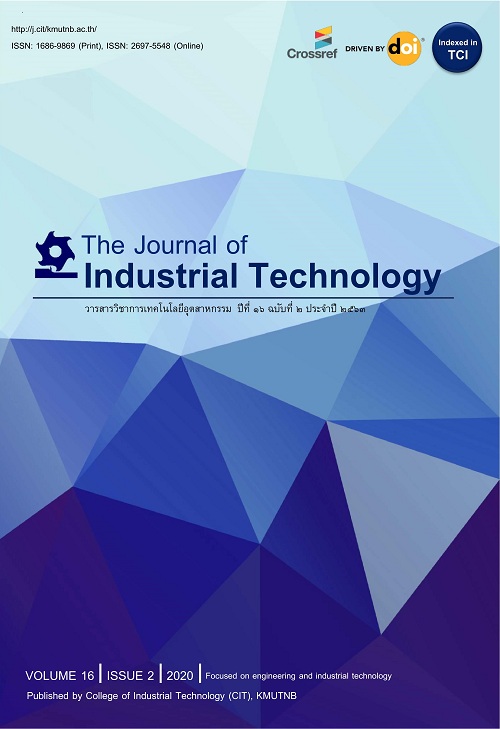The Engine Start Ability of Acetone-Butanol-Ethanol Blended Diesel Fuel for a Common Rail Diesel Engine
ความสามารถในการสตาร์ทของอะซิโตน-บิวทานอล-เอทานอลผสมดีเซลเป็นเชื้อเพลิงสำหรับเครื่องยนต์ดีเซลระบบฉีดเชื้อเพลิงแบบคอมมอนเรล
Abstract
การนำ อะซิโตน-บิวทานอล-เอทานอล หรือ ABE ผสมกับน้ำมันดีเซลในสัดส่วนร้อยละ 20 (ABE20) มีศักยภาพในการเป็นเชื้อเพลิงทดแทนน้ำมันดีเซล เนื่องจากสามารถนำไปใช้ในเครื่องยนต์ดีเซลที่ไม่มีการดัดแปลงได้โดยมีผลต่อสมรรถนะของเครื่องยนต์ การเผาไหม้ และการปลดปล่อยมลพิษที่แตกต่างจากดีเซลเพียงเล็กน้อย ตลอดจนมีเสถียรภาพในการทำงานไม่แตกต่างจากน้ำมันดีเซล อย่างไรก็ตาม การมีส่วนประกอบของแอลกอฮอล์ใน ABE20 ส่งผลต่อความสามารถในการจุดระเบิดที่ลดลงอย่างมีนัยสำคัญเมื่อเปรียบเทียบกับน้ำมันดีเซล อีกทั้งมีค่าความร้อนแฝงในการกลายเป็นไอที่สูงกว่าน้ำมันดีเซล จึงส่งผลต่อความสามารถในการสตาร์ทเครื่องยนต์ ดังนั้น งานวิจัยนี้จึงมีวัตถุประสงค์เพื่อประเมินความสามารถในการสตาร์ทเครื่องยนต์เมื่อใช้ ABE20 เป็นเชื้อเพลิงที่อุณหภูมิห้องทดสอบต่างกันในเครื่องยนต์ดีเซลที่มีระบบฉีดเชื้อเพลิงแบบคอมมอนเรล และตรวจสอบความสิ้นเปลืองเชื้อเพลิงขณะทำการสตาร์ทและเดินเบาต่อเนื่อง 60 วินาที จากผลการทดสอบพบว่า ABE20 ใช้ระยะเวลาในการสตาร์ทยาวนานกว่าดีเซลในทุกสภาวะการทดสอบและมีการบริโภคเชื้อเพลิงที่มากกว่าดีเซล อย่างไรก็ตาม เมื่อลดอุณหภูมิห้องทดสอบลง 10 องศาเซลเซียส ABE20 ส่งผลกระทบต่อความสามารถในการสตาร์ทเครื่องยนต์เล็กน้อยแต่ไม่ส่งผลกระทบต่อความสิ้นเปลืองเชื้อเพลิง
Acetone-Butanol-Ethanol (ABE) blended with diesel fuel in 20% by volume (ABE20) has been a promising alternative fuel for replacing diesel fuel. Consequently, it can be used in the unmodified diesel engine with slight effects on engine performance, combustion, and emissions, presenting stability during engine operation similar to diesel. However, ABE20 is composed of alcohol, presenting the low auto-ignition ability and high latent heat of vaporization compared to diesel fuel. These can affect the engine start ability. Therefore, this work aims to evaluate the engine start ability of ABE20 on a common rail diesel engine in different testing room temperatures and to investigate the fuel consumption during the period of engine start and continuously idling in 60 seconds. The experimental results show that ABE20 presented the engine start timing longer than diesel fuel for all testing conditions and its fuel consumption was higher than diesel fuel. However, the reduction of ambient temperature by 10°C insignificantly affected engine start ability but not for fuel consumption.
Keywords
[1] H. Wu, K. Nithyanandan, N. Zhou, T.H. Lee, C.F. Lee, and C. Zhang, Impacts of acetone on the spray combustion of acetone-butanol-ethanol (ABE)-diesel blends under low ambient temperature, Fuel, 2015, 142, 109–116.
[2] H. Wu, K. Nithyanandan, T.H. Lee, C.F. Lee, and C. Zhang, Spray and combustion characteristics of neat acetone-butanol-ethanol, n-butanol, and diesel in a constant volume chamber, Energy Fuels, 2014, 28, 10, 6380–6391.
[3] O. Nilaphai, C. Hespel, S. Chanchaona, and C. Mounaïm-Rousselle, Spray and combustion characterizations of ABE / dodecane blend in comparison to alcohol / dodecane blends at high-pressure and high- temperature conditions, Fuel, 2018, 225, 542–553.
[4] H. Wu, K. Nithyanandan, J. Zhang, Y. Lin, T.H. Lee, C.F. Lee, and C. Zhang, Impacts of acetone – butanol – ethanol (ABE) ratio on spray and combustion characteristics of ABE – diesel blends, Applied Energy, 2015, 149, 367–378.
[5] K. Komanee, S. Chuepeng, and O. Nilaphai, An experimental investigation of ABE-diesel blend on performance, combustion, and emissions in a compression ignition engine, The 11th International Conference on Mechanical Engineering (ICoME 2020), Proceeding, 2020, Art. No. AEC0002.
[6] A.K. Agarwal, A. Dhar, J.G. Gupta, W.I. Kim, K. Choi, C.S. Lee and S. Park,Effect of fuel injection pressure and injection timing of Karanja biodiesel blends on fuel spray, engine performance, emissions and combustion characteristics, Energy Conversion and Management, 2015, 91, 302–314.
[7] O. Nilaphai, The effect of acetone-butanol-ethanol blended diesel fuel on the engine stability of a single cylinder diesel engine, The Journal of Industrial Technology, 2020, 16(2), 89–103. (in Thai)
[8] A. Jamrozik, W. Tutak, R. Gnatowska, and Ł. Nowak, Comparative analysis of the combustion stability of diesel-methanol and diesel-ethanol in a dual fuel engine, Energies, 2019, 12, 971.
[9] G. Hernandez, Combustion studies for high speed direct injection diesel engines under low temperature cold start conditions, Ph.D. Thesis, Departamento de Maquinas y Motores Termicos, Universidad Politecnica de Valencia, Spain, 2012.
[10] M. Palanisamy, Characteristics of cold start of a diesel engine using Jp8 and ULSD fuels, Master Thesis, The Graduate School of Wayne State University, Wayne State University, USA, 2013.
[11] A. Celik, M. Yilmaz, and O.F. Yildiz, Improvement of diesel engine startability under low temperatures by vortex tubes, Energy Reports, 2020, 6, 17–27.
[12] R.B. Gupta, Cold starting of IC engines, Defence Science Journal, 1988, 38(1), 77–85.
[13] A.S. Ramadhas and H. Xu, Intake air heating strategy to reduce cold-start emissions from diesel engines, Biofuels, 2014, 9(3), 405–414.
[14] http://climate.tmd.go.th. (Accessed on 23 July 2021)
[15] A.S. Ramadhas, H. Xu, D. Liu, and J. Tian, Reducing cold start emissions from automotive diesel engine at cold ambient temperatures, Aerosol and Air Quality Research, 2016, 16(12), 3330–3337.
[16] G.F. Xiao, X Q. Qiao, Z. Huang, and Z.P. Chen, Improvement of startability of direct-injection diesel engines by oxygen-enriched intake air, Proceedings of the Institution of Mechanical Engineers, Part D: Journal of Automobile Engineering, 2007, 221(11), 1453–1465.
DOI: 10.14416/j.ind.tech.2021.09.003
Refbacks
- There are currently no refbacks.






